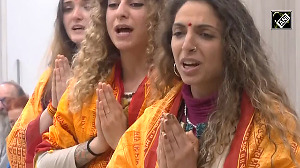India has opposed a proposal by a group of industrialised countries led by the United States and the European Union at the World Trade Organization on addressing the issue of market access for industrial goods in the Doha trade negotiations.
The industrialised country coalition, comprising the United States, the European Union, Japan, Canada, Iceland, New Zealand, Norway and Switzerland, circulated a document calling on the Chair for Doha Industrial Market Access Negotiations Ambassador Don Stephenson for no change in the draft modalities issued in July this year.
The chair is holding meetings with key members to prepare a revised draft that will be issued in late January next year.
The developed countries said the chair's existing draft proposals captured all elements of the Doha mandate which require industrialised countries to take bigger commitments than developing countries in cutting industrial tariffs based on the principle of less-than-full reciprocity.
The chair had proposed that industrialised countries reduce their industrial tariffs by using a coefficient between eight and nine in the Swiss formula.
Stephenson insisted on a coefficient between 19 and 23 for developing countries to cut their industrial tariffs. He also suggested certain exemptions for developing countries.
Under the Swiss formula, countries with high tariffs, especially in the developing world, will cut them by a bigger margin than the industrialised countries which have low tariffs.
For example, India's average industrial trade tariffs that are bound at the World Trade Organization at little over 30 per cent will come down to a below 13 per cent as against the average bound industrial tariffs in industrialised countries coming down to below 3 per cent from the existing 6 per cent.
Several developing countries who are members of the NAMA 11, of which South Africa, India, Brazil, Argentina, Indonesia are key members, called for substantial changes in the draft parameters on the ground that they were fundamentally flawed and went against the mandate.
A non-group of developing countries like Costa Rica, Singapore, Chile, Pakistan, Colombia, Mexico, however, supported the proposals given their low industrial tariffs.
In the ensuing tug-of-war between different groups of countries in shaping the revised draft parameters, the Indian trade envoy, Ambassador Ujal Singh Bhatia, described the proposal made by the advanced countries as "as a mere repetition of their position and does not contribute to convergence in any way."
India urged the :chair to produce a text that reflects all the members' views so than it can be a good basis for horizontal negotiations that will focus on the tradeoffs in different areas of the Doha mandate."
Brazil's Chief trade negotiator Roberto Azevado said there would be serious risks if there were no major changes in the draft revised parameters.
Both Brazil and India, with other developing countries, also dismissed a proposal made by the US and the EU to eliminate tariffs on some 43 environmental products on the ground that the proposal was "biased" and "protectionist."
But a senior EU trade official told Business Standard that "their proposal clearly shows that even after applying the formula cuts the divide in the industrial tariffs between industrialized countries and developing countries will be further widened by three times," arguing that it is wrong to say that their proposal goes against the mandate.







 © 2025
© 2025